Right on time
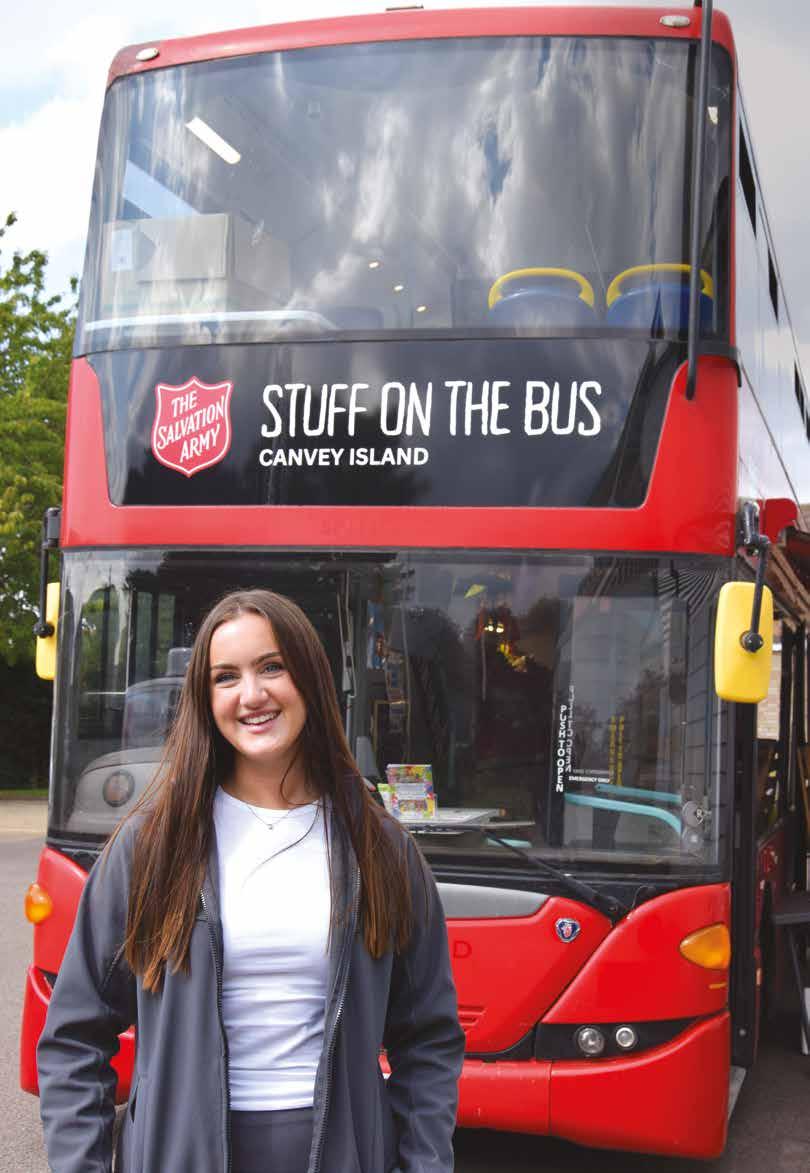
Supermarket on wheels is just the ticket


Supermarket on wheels is just the ticket
The Salvation Army is a Christian church and registered charity seeking to share the good news of Jesus and nurture committed followers of him. We also serve people without discrimination, care for creation and seek justice and reconciliation. We offer practical support and services in more than 700 centres throughout the UK. Go to salvationarmy.org.uk/find-a-church to find your nearest centre.
The Salvation Army first published a newspaper called the War Cry in London in December 1879, and we have continued to appear every week since then. Our name refers to our battle for people’s hearts and souls as we promote the positive impact of the Christian faith and The Salvation Army’s fight for greater social justice.
Every week in the War Cry, we aim to bring you a variety of stories to keep you entertained and informed. In this issue we cover a community café, singing groups, residential centres for people experiencing homelessness, a bus and ponies.
It is a diverse range of topics, but what links each story is the fact that they all demonstrate how The Salvation Army is helping people from all walks of life.
The church and charity, which this year is celebrating its 160th anniversary, has a long history of changing lives. Whether they be an older person living with dementia, a child dealing with trauma, a parent struggling with the cost of living or someone with no place to call home, The Salvation Army offers them practical, emotional and spiritual support.
Editor: Andrew Stone, Major
Deputy Editor: Philip Halcrow
Staff Writer: Emily Bright
Staff Writer: Claire Brine
Staff Writer: Ewan Hall
Editorial Assistant: Linda McTurk
Graphic Designer: Mark Knight
Graphic Designer: Natalie Adkins
Email: warcry@salvationarmy.org.uk
The Salvation Army United Kingdom and Ireland Territory 1 Champion Park London SE5 8FJ
Tel: 0845 634 0101
Subscriptions: 01933 445445 (option 1, option 1) or email: subscriptions@satcol.org
Founders: Catherine and William Booth
International leaders:
General Lyndon Buckingham and Commissioner Bronwyn Buckingham Territorial leaders: Commissioners Jenine and Paul Main
Editor-in-Chief: Major Julian Watchorn
0043-0226 The
Army
registered charity. The charity number in England, Wales and Northern Ireland is 214779, in Scotland SC009359 and in the Republic of Ireland CHY6399.
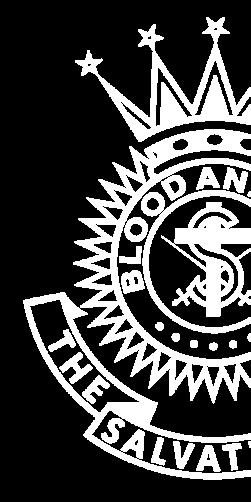
Printed by CKN Print, Northampton, on sustainably sourced paper Issue No 7746 6 September 2025

Your local Salvation Army centre
When appropriate, that help can come in the form of professional care from experienced employees; but at other times, people’s needs are being met by volunteers and members of the church, who are motivated to reach out to others by their Christian faith. They believe that God loves and values everyone and wants them to have the best possible life. The Bible says that God’s Son, Jesus, told his followers that he had come so that people ‘may have and enjoy life, and have it in abundance’ (John 10:10 Amplified Bible).
Christians believe that they can help people to enjoy a full and meaningful life by providing practical assistance and by showing them how a relationship with God improves everything.
If you would like to know more about the ways in which The Salvation Army is helping people to experience a full life or if you are interested in supporting its work, visit salvationarmy.org.uk
When you’ve read the War Cry, why not pass it


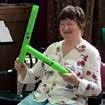
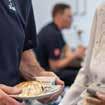

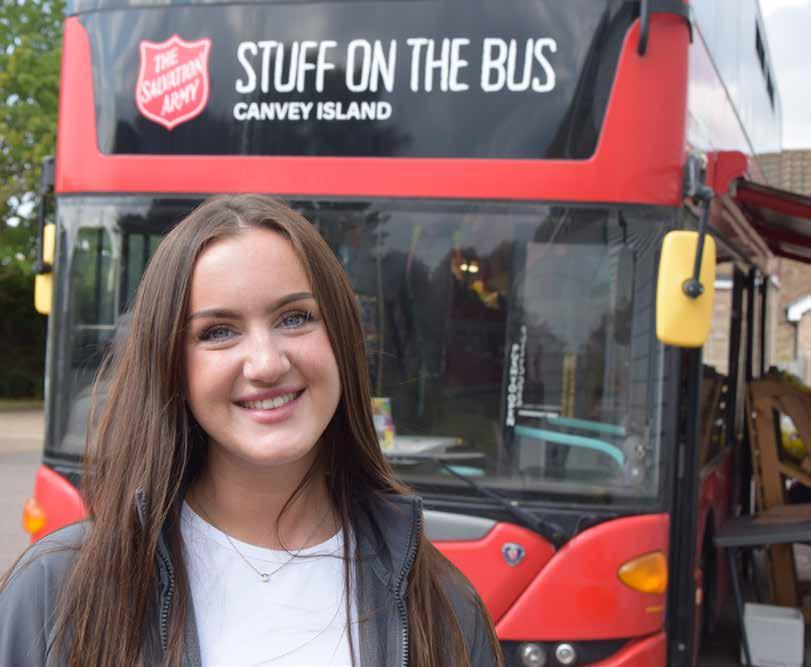
Feature by Philip Halcrow
Abus has pulled up at its first stop of the day – and long before the double-decker opens its doors, a line of people are already waiting to board. Standing in the sun, they chat with each other and with the driver, who is standing outside. Retired London bus driver Tim Allen used to carry passengers through the streets of the capital; now he is a volunteer, driving Stuff on the Bus around Canvey Island.
Run by The Salvation Army, Stuff on the Bus is a mobile supermarket that offers members of the Essex estuary community subsidised groceries – some items of which, at around 10 o’clock on this Friday morning, are being restocked by manager Holly Alberici and her team of helpers.
When the bus opens, the shoppers –who have paid an annual membership of £5 to join the scheme – begin choosing fruit and vegetables from the rack outside the doors, and boxes of cereals, tins, jars and packets of dried goods from the
shelves on the lower deck inside.
After picking up what they need, they head to the front of the bus, where Holly tots up the bill, takes their payment and stamps their loyalty card.
Later, sitting on the upper deck, Holly, a pioneer partner for The Salvation Army’s work on Canvey Island, tells me about the thinking that started the project. It was – she says – the idea of her boss, emerging mission officer Wendy Watkins.

middle. We give people back the choice and we give them their dignity – that’s our whole ethos.
‘There were so many food banks on the island and there were supermarkets,’ says Holly, ‘but there seemed to be nothing in the middle. So you could go to a food bank and be given a bag of food for free – which is brilliant – or go to a supermarket and pay the crazy prices now. And people were reporting that they were feeling shame and would get upset when they went to a food bank, although you shouldn’t feel ashamed if you need help.
‘So we aimed to fill the gap in the
‘We try to stock branded items as well as supermarket-own saver products, and we stock things that you might want to buy for a Friday treat.
‘We buy 99 per cent of what is on our shelves. We get funding from Essex County Council and from Feeding Britain and other charities, and we get some public donations. We buy at full price
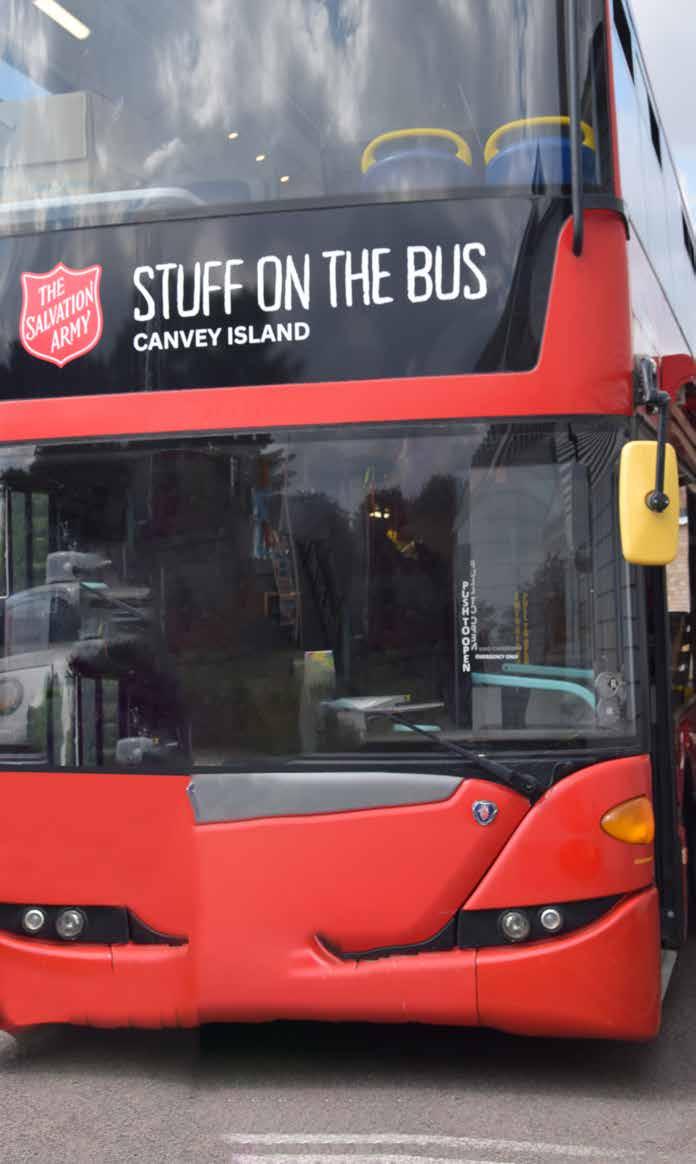
From page 3
and then we discount it by 30 per cent.’
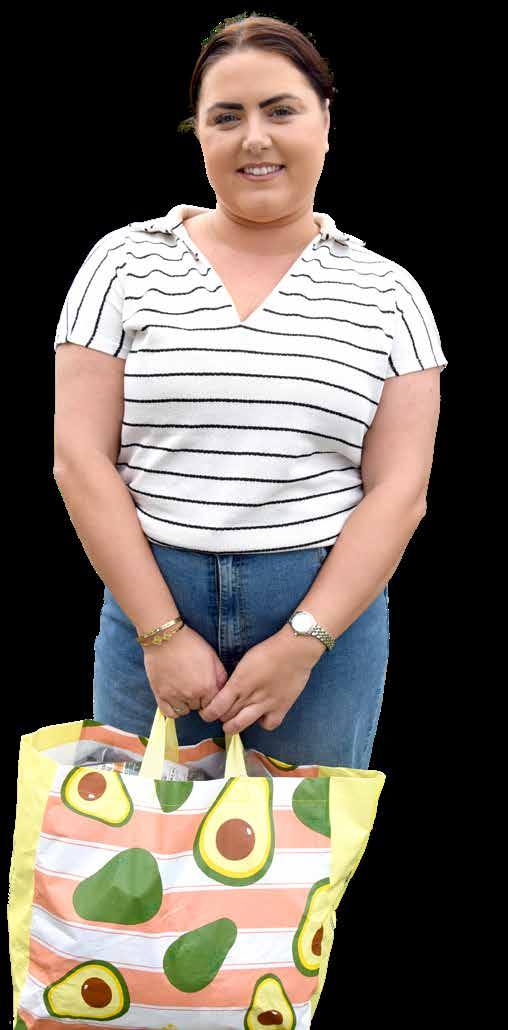
Holly says that putting the items on the bus – a vehicle bought at a reduced price from the Ensignbus Company and refitted for its new purpose by SEC Works in Faversham – brings the benefit of making the shop accessible. People don’t have to run a car, spend money on petrol or worry about what to do with their children when going shopping.
‘And we make the bus a nice place to be,’ she adds. ‘The volunteers are really friendly, and we have music playing.’
Accompanied by the faint sounds of Coldplay’s ‘Viva la Vida’, Holly says that Stuff on the Bus provides more than food, drink and toiletries – and it has adjusted its operation to ensure that it offers the most useful service.
‘When we first set out, we had this idea that customers could get food downstairs and then there would be a wellbeing area upstairs where there would be people from the NHS, The Salvation Army’s Employment Plus, the Department for Work and Pensions and other groups. The thinking was that people could get their shopping done and then get debt advice or help if they wanted to apply for universal credit or housing.
‘But moving forward, we found that people didn’t really need that. What people were calling out for was
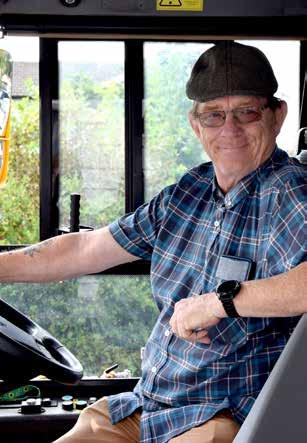
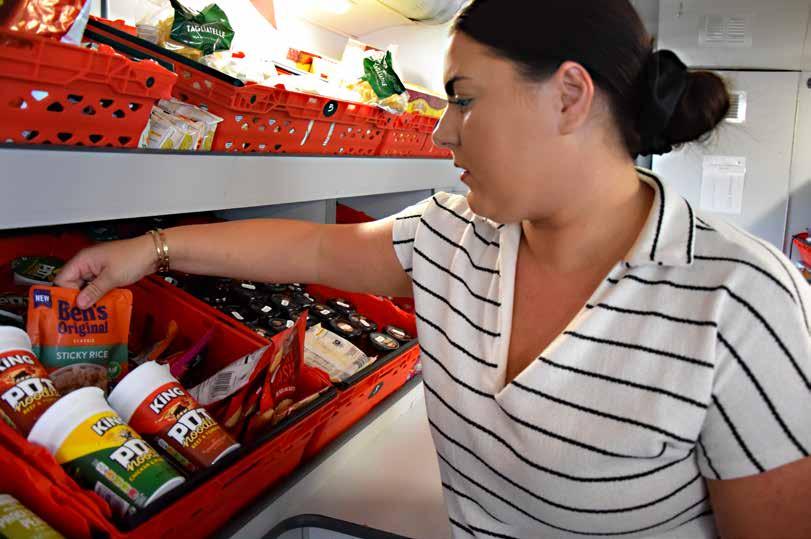
community. So – although we still have those contacts with other groups and we can refer people to them if they ask for help – we now run things like coffee mornings and Bible studies.’

Holly’s mention of Bible studies points to the faith that fuels the project.
‘There are a lot of churches on Canvey Island,’ she says, ‘but when we’ve spoken to our customers, we’ve found that they don’t necessarily feel that they can just walk into a church at any time and know that they’ll be accepted. We need to create a place where church is accessible and doesn’t seem scary.
‘This bus is our open, welcoming church. So when people visit us, even if they don’t have a faith, they are feeling God’s love through what we’re providing and what they’re receiving.
‘We have handed out little booklets on the Lord’s Prayer, and we’ve had little Jesus figurines, which the kids really like.
‘And Stuff on the Bus is an accessible way for people to be able to chat about their faith. A lot of our members have said that they do pray every night or when they need hope, but they don’t really have a space to talk about it. This is where they can exercise their faith.’
They’re such lovely people on the bus
is thankful for the volunteers who help run the project, including the drivers who help take the bus round its various stops every Tuesday and Friday.
‘We have one bus driver called Ross Newman, who, funnily enough, used to own this bus – because he used to own Ensignbus Company. First Bus also supply us with a driver every other Tuesday. They’ve really helped us, because bus drivers are few and far between.’
The volunteers are also appreciated by the customers. After finishing her shop, Crystal Price, who lives a short walk from this stop outside St Nicholas Church,
says: ‘They’re such lovely people on the bus.
‘It’s really handy, because it helps you to be able to afford things. Nowadays, going to the supermarkets is so much more expensive and, being on a low income, you can just go to the bus and get your membership. It’s only £5 and you just renew it every year.
‘And at Easter they gave us a little hamper, with a little leg of lamb and veg so that we could have our Sunday dinner.
‘It’s run really well too, so if you want something but they don’t have it, they will try and have it for you the next time you go. When my little girl was smaller, they used to make sure they had nappies, which helped a lot, because they’re quite expensive in the shops.’
Holly has heard stories of the difference that the bus has made to people.
‘One lady said that, because of the money she had saved by coming to the bus, she had finally been able to buy the £5 Barbie shoes that her granddaughter had wanted for ages.
‘It puts it into perspective. The bus had given her the ability just to buy something for her granddaughter. It’s all about dignity.’

‘Horses have always been a part of my life,’ says Major Viv Prescott, who leads a Salvation Army church in the Forest of Dean, Gloucestershire. ‘Before I was a Salvation Army officer, I was a riding instructor.’
And it was Viv’s ongoing equine experience that would transform her work after she became a Christian minister.
‘When I was beginning The Salvation Army’s work in the Forest of Dean,
there was one family I was building a relationship with,’ she says. ‘The mum called one day to say, “Can you help us? Our daughter is out of control. She’s locked us all out of the house and is throwing furniture out of the upstairs bedroom window. Can you talk to her? We can’t get through to her.”’
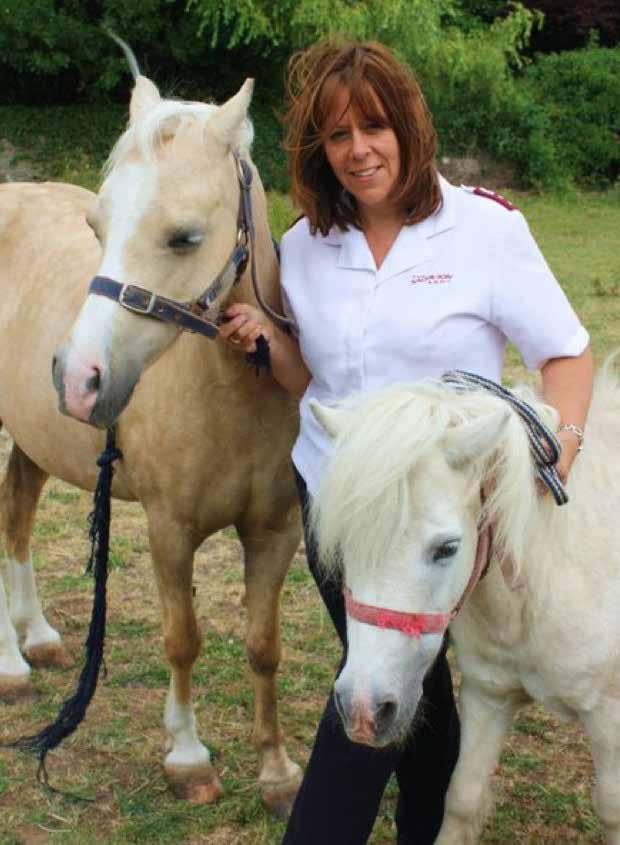
So Viv invited the girl along to the village stable yard.
‘To distract her and help her unwind a little, I asked her to hang up a hay net in Marley’s stable,’ she remembers. ‘I’d rescued Marley from a very abusive situation, and he was covered in scars. He picked up on any negative energy, and when the girl walked into his stable, he was terrified. He cowered in the corner. She came out, saying: “He don’t like me. He won’t come near me.” I suddenly realised that he was frightened of her.’
Viv encouraged the girl to take a breath and talk about her struggles. After offloading about troubles at school, she was in a more positive frame of mind. And when she walked back into the stable, Marley came straight over to her. Viv was amazed.
‘I had heard about equine-facilitated therapy, and it had always fascinated me,’ she says. ‘But I’d never seen it in
Interview by Emily Bright
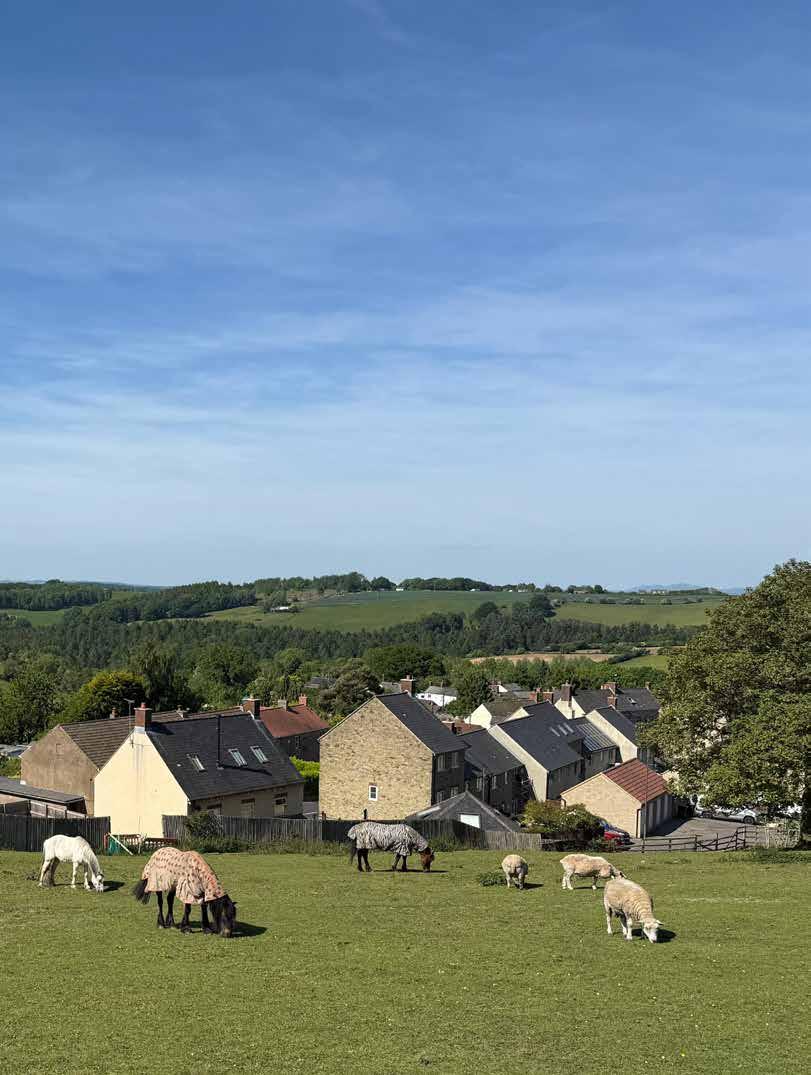
practice. I realised that God was going to use my horses for a purpose.’
Viv decided to approach a special educational needs co-ordinator to see whether equine-assisted therapy could help their primary school pupils. The answer was a resounding yes, so Viv trained to become a qualified equineassisted practitioner.
Fifteen years ago, she set up Gleam (Growth and Learning Equine Assisted Ministry), which runs two days a week, taking students from primary and secondary schools and referrals from the probation service and social services. She and her four ponies work with children or young people who are
struggling with anxiety or trauma, are at risk of school exclusion or have special educational needs.
There are two main parts to Gleam’s work. The project runs a basic horse care qualification with the UK Rural Skills scheme, which it offers to secondary schools and a college specialising in adults with learning support needs. It also provides ‘equine-facilitated learning’, enabling children and young people to process their struggles in a therapeutic environment.
‘Gleam has been transformational,’ enthuses Viv. ‘Since coming here, a lot of the children and young people have grown in confidence and in an understanding of who they are.
‘When they arrive at the yard, I’ll ask them what sort of day they’ve had. And they’ll say: “It’s been OK.” Conversation closed.
‘Then I take them into the field where the horses are. If a child is actually
OK, I know my herd will be calm and peaceful. But if a child has a lot of pentup anxiety and anger in them that they’re not prepared to focus on, my herd will react to that and scatter. I’ll have horses bombing round the field because the energy is so high.
‘That gives me the opportunity to say to the child: “What might have set the herd off? It might be that one of us is feeling anxious about something.” Then the conversation starts, because they can see the impact that their energy is having.
‘So we’ll do our breathing, we’ll bring the energy down, and the horses will become peaceful and approach us.’
Viv believes that such an approach helps children ‘understand how their emotions are valid and powerful, because they can set a horse galloping off across
Turn to page 8 f
the field. It gives us the opportunity to talk things through, and then I can give them tools to see what impact their energy has and learn how to manage it.’
Gleam’s slower speed also creates an environment where children and young people can feel safe and more relaxed.
‘When people come to the yard, they’ll work at the horse’s pace,’ says Viv. ‘They have got to stand back and wait. Everything slows down, and that is very therapeutic for people who are on high alert the whole time, feeling under threat and unsafe. It gives them space and security.’
The starting point for the children’s interactions with horses and ponies, Viv says, is learning how to greet the animals safely and how to read them.
‘Then I’ll say to the children: “I want you to come back and tell me if there’s one particular pony that you feel drawn to, and that one will be your friend.”
‘Often it is the pony that is drawn to the child. They choose each other and they’ll build a relationship. The child does a lot of grooming and basic horse care as they go along, but the most important thing is building trust, confidence and a relationship. The children will do all sorts of exercises with their ponies.’
Viv shares an example.
‘They might build their life stories using
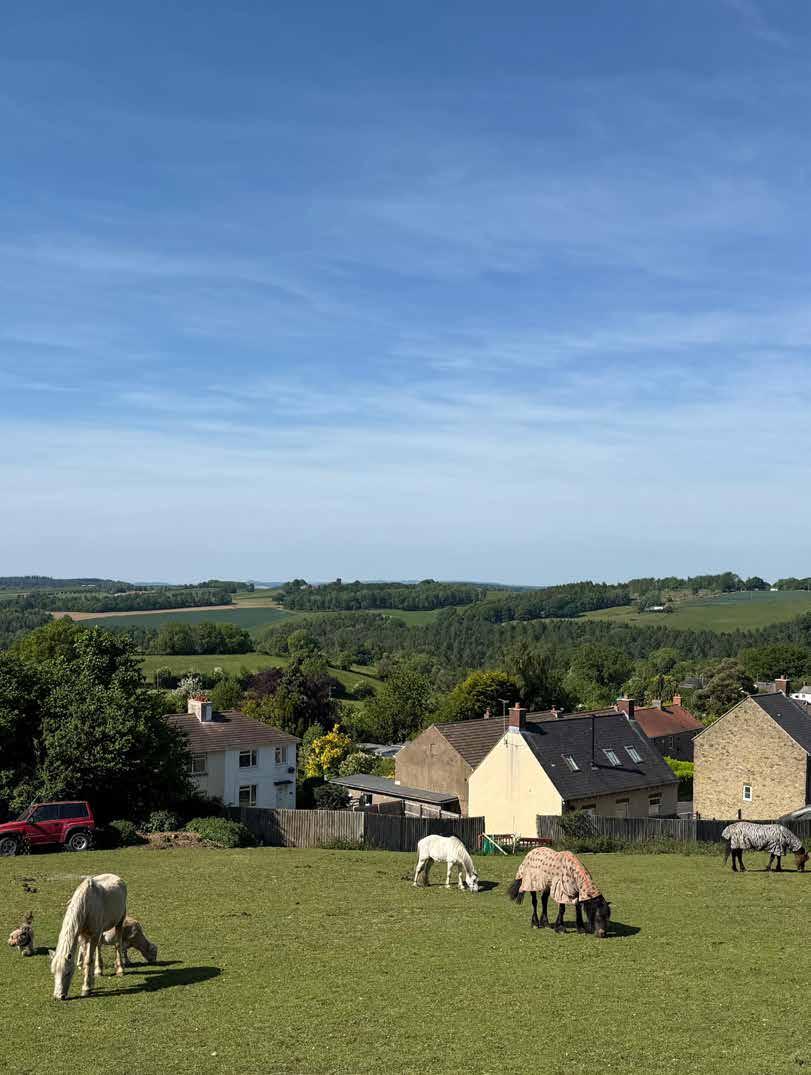
different items from around the field,’ she says. ‘A set of bending poles might represent when life felt complicated, or a box might represent when a parent or grandparent died. Then they will take their pony with them through their life story and revisit these different moments with them.
A young man told me that the ministry had saved his life
‘The ponies often will mirror what’s going on with the child, so I can see where things are difficult and traumatic. I might interject and say: “Do you want to tell me about what happened there, how you came through that and what you learnt from it?” It’s a way of working through and validating their story.’
Viv has seen the impact of her ministry lasting a long time after children have moved on from Gleam.
‘A young man came up to me and told me that it had saved his life,’ she recalls. ‘There was another moment when I took my adopted granddaughter horse riding at a local stable – we don’t ride the horses at Gleam. There was a lovely young woman on the yard. She told me
that she had come to Gleam when she was at primary school, and that the way the horses had made her feel set the course of her life.’
Viv sees her equine project as a vocation.
‘I feel that I am called to help people recognise God through his creation,’ she says. ‘It’s important to take the whole experience of faith outside of the four walls of a church. Nature features in the very first book of the Bible. Creation is how God spoke to us, how he showed us who he is, and he hasn’t stopped doing that.’
In that spirit, Viv runs outdoor church services.
‘Some Sundays, we run “wild church” up at the field,’ she explains. ‘We have what we call our cathedral area under a grove of trees, with logs for people to sit on. Animals will wander in and out, joining us for the worship or ignoring us completely.’
Viv takes her lead from Jesus’ style of teaching.
‘If you look at how he ministered, he was often outside. He would refer to nature to explain and illustrate some of his points about the Kingdom of Heaven. I’m attempting to do what Jesus did –using nature as a tool to show people how much God loves them.’
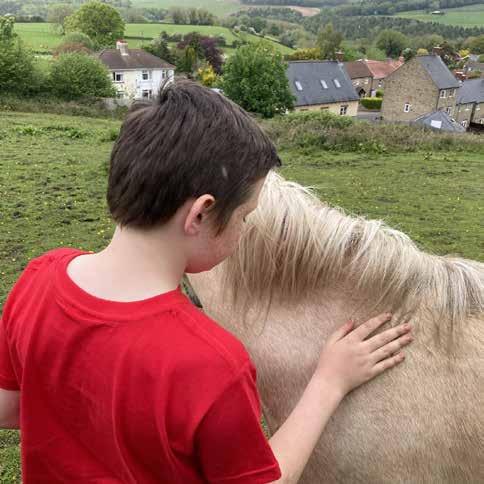
Gleam offers therapeutic support to children and young people through ponies
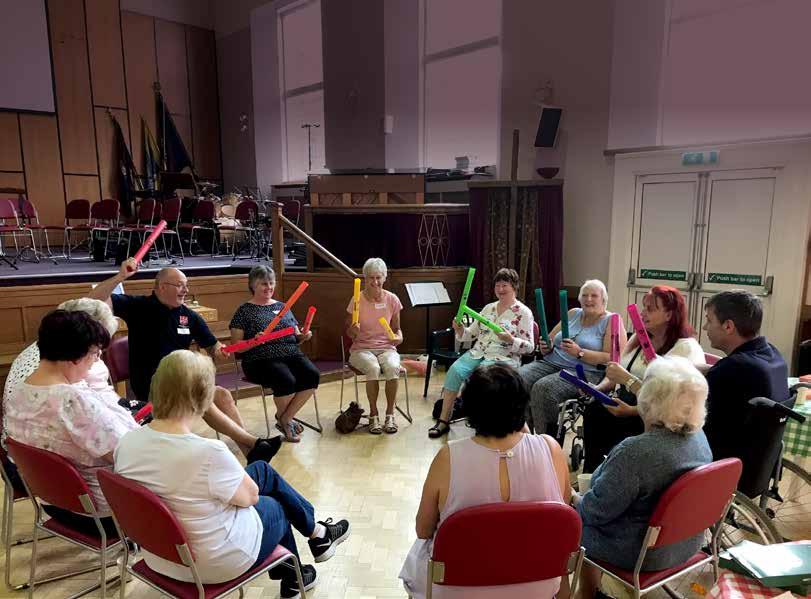
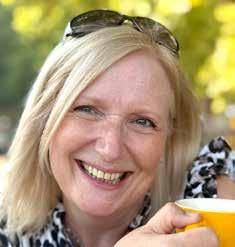
Ali Thornton-Dean
‘Growing older is a privilege,’ says Ali Thornton-Dean, an outreach mission partner for older people’s ministries in The Salvation Army. ‘We know that not everybody gets to do it. So every day that we are given to grow older in our life is a blessing.’
While ageing can be a positive experience, the church and charity also recognises that living longer can present challenges. It’s why, across the UK and the Republic of Ireland, The Salvation Army runs a variety of activities to meet the needs of older people and the individuals who care for them.
Since its beginnings, The Salvation Army has believed that caring for people in the later stages of life is important.
‘Historically, we have always worked with people of all ages,’ says Ali. ‘The Salvation Army is an intergenerational church. We have lots of older people engaging with our Sunday worship services. We also have up to 4,000 older
ALI THORNTON-DEAN explains how The Salvation Army supports people in later life, along with their care partners
Interview by Claire Brine
people attending specific activities that we run for them each week.
‘A lot of our churches provide lunch clubs for older people, which enables them to meet together socially and share a meal, as some older people are fighting loneliness and isolation.
The group might sing together or play bowls
‘We
also run Cameo groups. The name stands for “Come and meet each other” – and they are about doing just that.
‘Some Cameo groups might have guest speakers, or the group might sing together or play bowls or board games – or learn about Jesus together. Or the group might go out for a trip to a garden centre. There are many different expressions of Cameo clubs being run
across communities.
‘What’s important about our activities is that we remember to include carers, or “care partners” as some people prefer to be called. Caring for a loved one in old age can be tiring or isolating, and sometimes care partners can be forgotten. But The Salvation Army has a responsibility to ensure that they have the support they need, because we believe that we have the responsibility to look after everyone, from birth to death.’
The desire to support people whatever their age arises from The Salvation Army’s Christian foundations. Ali explains why faith is a key motivator.
‘The Bible says that we should love one another, just as God loves us,’ she says. ‘Telling people that God loves them is not a message just for younger people. It’s
Turn to page 10 f
for older people too.
‘Our later years have a purpose. And the wealth of experience that older people have can be invaluable.’
Much of The Salvation Army’s work is supported by a great number of people aged over 65 who are willing to give up their time by serving as volunteers.
‘We couldn’t do what we do without them,’ Ali says. ‘Our older people are the smiley faces serving behind the counters in our charity shops. They are the people serving tea and toast at our homeless drop-ins or the ones serving and chatting with those who come into the weekly coffee morning.
‘They’re also the people helping at our parent-and-toddler groups – and there’s something so beautiful about watching
the older generation helping the younger generation. These days a lot of young parents are raising their children without a family support network around them, so it’s lovely to see some of our older people stepping into that gap.’
Recognition of the value of older people is one of the key reasons why Ali wants to tackle ageism. She feels that some of the language used about them is derogatory – especially when it comes to older people living with dementia.
‘People say that they’ve “lost their marbles” or that they are “going doolally”,’ she explains. ‘That’s a terrible way to talk about others – or even ourselves. I think we need to be much more respectful in how we talk about older people. We need to see them as
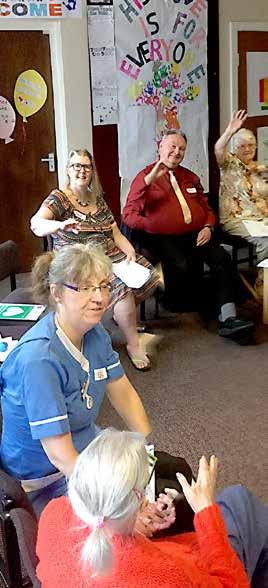
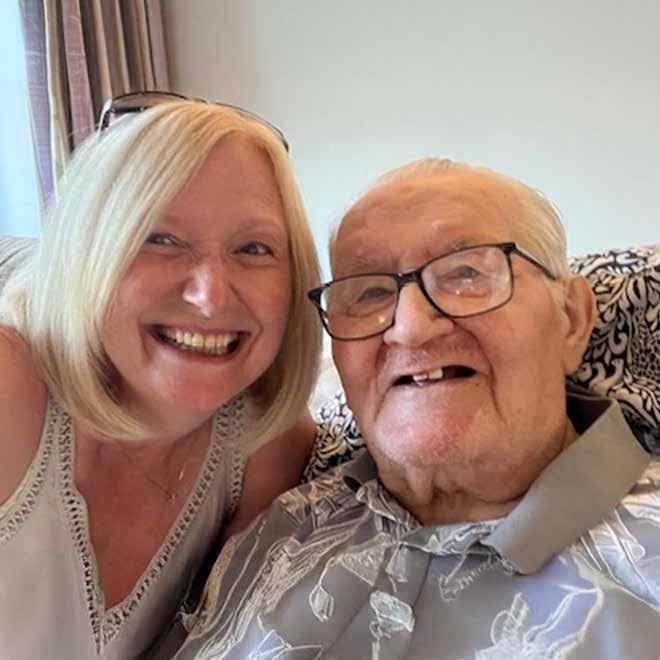
God sees them. In his eyes, they are beautiful human beings.’
In recent years, one of the most significant ways in which The Salvation Army has been supporting older people who are living with dementia is through Singing by Heart, group sessions which use a mixture of sacred and secular songs from across different eras.
‘Singing by Heart is a dementia-friendly singing session – it’s not a choir,’ explains Ali. ‘It might start with the group singing something like “Amazing Grace”, followed by a song by the
‘The sessions also include time for a Bible verse and prayer, so it’s a worship

experience. Some people who attend regularly have told their leaders: “This is my church.” It just happens to take place on a weekday, rather than a Sunday. The Army runs Singing by Heart in more than 100 of its churches and centres.’
The sessions appear to be having a positive impact on people living with dementia, along with their care partners. Ali says that it provides them with an opportunity to meet other people living in similar situations, enabling them to relax and have fun together.
‘Music is also a great way for building a connection to God, because it’s good for the brain and good for the soul,’ she says. ‘It invokes memories. Leaders often find that when individuals living with dementia listen to music, they start to sing along – even if they are usually nonverbal.
‘It’s amazing to see. Family members sometimes tell us that they can’t believe the difference they’re seeing in their
loved ones.’
Supporting people living with dementia is also important to Ali for personal reasons. Last year, her mum and brother died from the illness. Her dad is currently living with dementia.
I can cope because I’m not doing it on my own
‘It
can be terribly hard and upsetting when family members have dementia,’ she says. ‘My reality is that I’m grieving for my mum and my brother. But when I go to visit my dad in his care home, I choose to put that aside and live in his reality. He believes that he sees my mum every day, and that he’s playing football with my brother in the park. So when he asks me: “Where’s your mum?” I reply that she’s just having a rest because she’s feeling tired today. I choose to
engage in what’s called therapeutic lying, because that’s what’s best for him.’
For Ali to move between the two worlds is not easy – but she finds strength and comfort in her relationship with God.
‘Because of my faith, I know that there’s a bigger picture in life, that the here and now is tiny compared to eternity,’ she says. ‘I know that grief won’t last for ever, and that there’s a bigger joy waiting for me. And in the meantime, God upholds me. He can do that for everyone.
‘Trusting in God doesn’t mean that I don’t cry or that I’m not bereft. It just means that the peace God gives me allows me to live. I can wake up every morning and say: “I can cope with whatever happens because I’m not doing it on my own. I’ve got God lifting me up.”
‘That’s how I keep going. I choose to remember that life is a beautiful thing. Every day is precious – so let’s embrace it.’
The Salvation Army provides residential accommodation for people who are experiencing homelessness and need a new start. It is work that is supported by its church members
Feature by Andrew Stone
Simon grew up in Southampton, spending his childhood in care. His dad had abused his mum, and it was safer for him and his sister to be out of the home environment. Simon grew up either with foster-parents or in children’s homes.
‘I was happy until I was eight years old, when a woman who didn’t like me took over the children’s home and would physically abuse me, slapping me round the face,’ he says. ‘When I was 10, I was sent to a boarding school. Half the children were Irish. They didn’t like the English and would beat me up. I then went to another children’s home.
‘From the age of 11 or 12, I suffered physical, mental and sexual abuse. It was hell. I was punched, slapped and flung across the room. From early on, I realised that if I didn’t want to be abused, the best way to do this was to cause trouble,
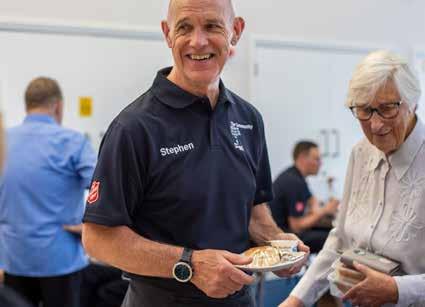
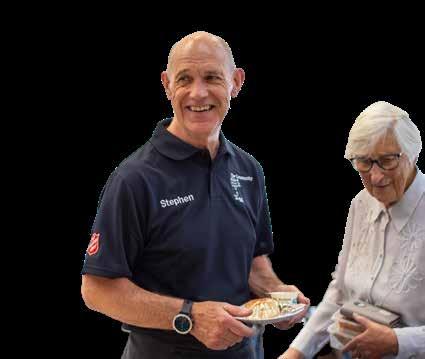
Stephen Shaw in the café at the Salvation Army church in Sholing, which raises money for the Booth Centre
which is how I dealt with the situation.’
Simon was fostered for the final time when he was 17, but when that didn’t work out, he found himself living in bed and breakfast accommodation.
‘I started to get in trouble with the police,’ he recalls. ‘I was in and out of prison for shoplifting and breaking into cars. It didn’t bother me going to prison, because my whole life had felt like being in prison.’
Simon eventually returned to Southampton, where he got into ‘silly relationships’ and started drinking and using drugs. Violent behaviour led him back to prison. On his release, he ended up living in a hostel and became hooked on cocaine.
‘It made me angry and paranoid,’ he says, ‘and when I heard anything on TV about child abuse, it really affected me. I met a support worker, Naveen. I would
only talk to him looking at the ground. Despite this, I was encouraged to get counselling about what had happened to me, and I opened up for the first time.’
Naveen moved to work at the Booth Centre, and Simon moved there too. This Salvation Army Lifehouse provides accommodation for people who have experienced homelessness. All residents are assigned a caseworker and given the opportunity to develop life skills.
‘I was there for 18 months, and at first I wouldn’t talk,’ Simon remembers. ‘Then I saw something on TV about one of the men who had worked at the children’s home where I had lived being convicted, and it made me really angry. The police were investigating the background and came to ask me questions.
‘It was hard, but I needed to do it. I wouldn’t want anyone to suffer like I have. I lived with what had happened

for many years, and all that time I wasn’t coping. I felt ashamed and weak. Emotionally I was like a yo-yo, but the support workers at Booth House were there for me from day one. When I went to court as a witness, loads of staff offered to come with me.
Simon was able to move into a housing association flat
‘Inever felt listened to before and now I do. Naveen would suggest things for me to do like painting the canteen, doing the pot wash in the café or going to the gym to keep my mind occupied. I’d grown up learning to judge people, and yet here we did things like play rounders with the staff, and I learnt that I’m not always right
about people – and I learnt to trust.
‘I’ve been shown the right way to treat people. I feel listened to and appreciated. I can talk to people who will tell the truth and listen. I’ve got nothing to be angry for now, and I have good memories here.’
The work at the Booth Centre is supported by members of the Salvation Army church in Sholing, Southampton. For the past 10 years, they have run a fortnightly community café, and this year some of the money raised through the café has been donated to the centre.
‘For us, connecting with the Booth Centre is really important,’ says Stephen Shaw, who co-ordinates the café. ‘The Salvation Army has a heart for God to reach out to people and to meet them where they are. For us to be able to support a local provision is great.’
The money was raised as part of the church and charity’s Big Connection
appeal, where members across the UK and Republic of Ireland find ways to raise funds for the community and social work carried out by The Salvation Army.
It is, as Simon affirms, work that is changing people’s lives. With the support he received at the Booth Centre, he was able to move into a housing association flat. He has since gone on to train as a peer mentor and returns to the centre to support the residents currently living there.
‘I come to the canteen for breakfast club, where I talk to people,’ he says.
‘I’ve been an angry person, but when I’m mentoring, I can listen. I would have been in prison if I wasn’t here. People ask me why I come back, and I say: “It’s the place that changed my life.”’
l Simon’s name has been changed

1. Tussle (5)
4. Disorder (5) 8. Constellation (3) 9. Punctuation mark (5)
10. Prickle (5)
11. Taxi (3)
12. Extreme (5) 13. Organise (7) 16. Flag (6) 19. Regret (6) 23. Masterly (7) 26. Entitlement (5)
28. Night bird (3)
Welcome (5)
Perfect (5)
Hatchet (3)
(5)
(5)
Pacify (7)
Fight (6)
Change (5)
Fleeced (5)
Ball (5)
Morsel (5)
Snake (3)

(5)
Revolver (3)
Noah’s ship (3)
Nothing (3)
Sooner (7)
Sum (5)
Catchphrase (6)




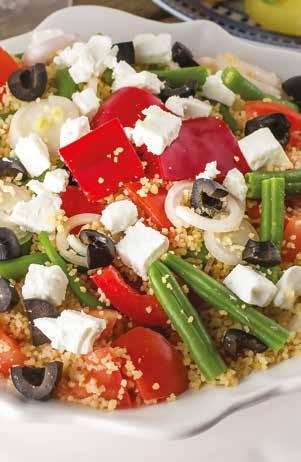
100g couscous
METHOD
180ml boiling water
1tsp olive oil
10g butter
75g green beans
1 red pepper, sliced into 2cm pieces
2 shallots, finely diced
2 tomatoes, diced
4 black olives, chopped
20g feta cheese, cubed
2tbsp lemon juice

Put the couscous in a pan with the boiling water, then add the oil and allow to stand for 5 minutes without heating.



Add the butter and gently heat for 5 minutes, then allow to cool.

In a separate pan, cook the green beans for 5-6 minutes and allow to cool, then chop into 2cm pieces. Tip into a bowl along with the couscous, pepper, shallots, tomatoes and olives.
Tip the mixture into a serving dish, crumble over the feta cheese, pour the lemon juice on top and mix everything together, to serve.

150g kale, stems removed, thinly sliced
20g reduced-fat spread
1 large leek, trimmed and thinly sliced
400g cooked root vegetables, mashed
1 large sweet potato (approx 225g), baked Freshly ground black pepper Oil spray
METHOD
Steam the kale in a pan for 5-10 minutes, until wilted. Remove from the heat and set aside.
Melt the spread in a large pan over a medium heat. Add the leek and cook for 5-6 minutes, until softened and starting to turn golden brown.
Add the leek and kale to a bowl along with the mashed root vegetables. Scoop out the flesh of the baked sweet potato and add to the mixture, then season with pepper. Stir thoroughly. Divide the mixture into 4 and shape into patties.
Place the large pan over a medium heat and coat with the oil spray. Cook the bubble and

